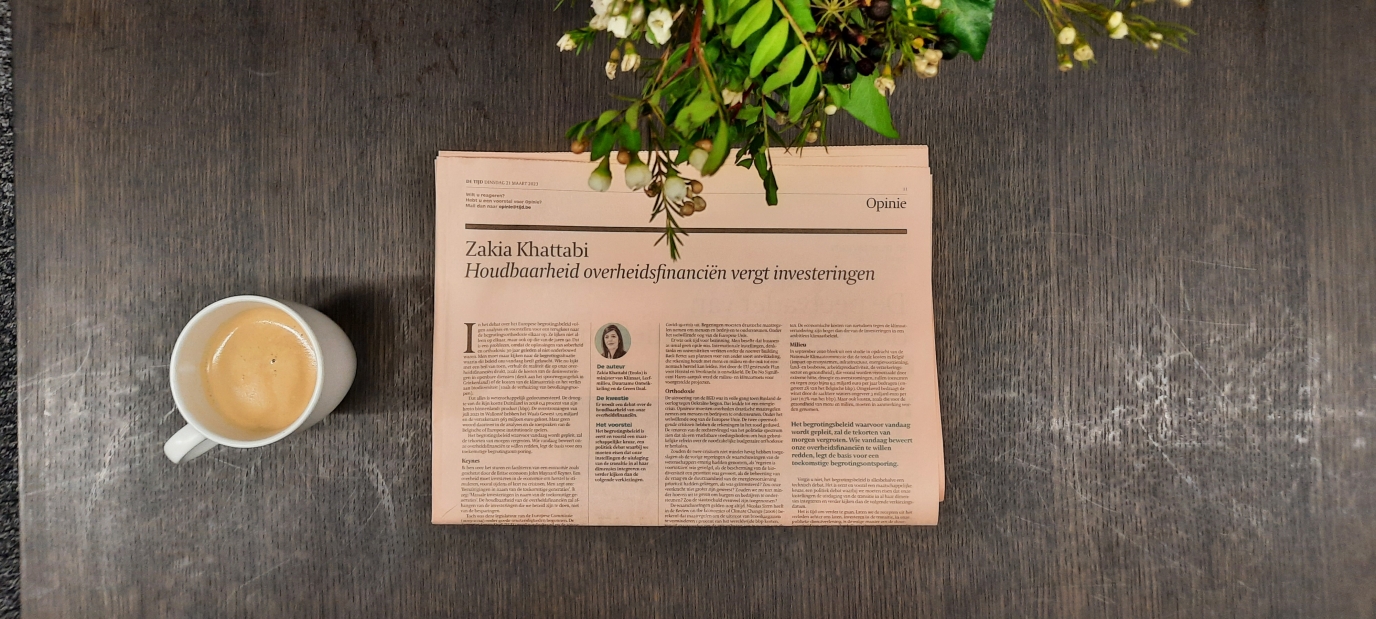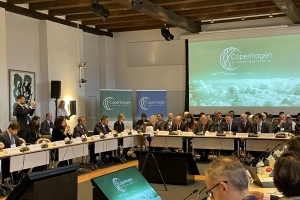Views | The sustainability of our public finances requires investment
 Article published in De Tijd
Article published in De TijdIn the debate on European fiscal policy, analyses and proposals for a return to fiscal orthodoxy follow one another. These are not only very alike, but also similar to those of the 1990s.
However, the advocated solutions of austerity and orthodoxy were unsubstantiated 30 years ago. One only needs to consider the budgetary situation in which these policies have brought us today. Those who look at the current situation through the glasses of then, conceal the realities of today, which weighs on our public finances. This includes the cost of disinvestment in public services (for example, in the management of COVID-19 or the railway accident in Greece) or the cost of the climate crisis and the loss of biodiversity (financial implications for our infrastructure, our economic activities, for health care or even for relocating populations).
All of this is supported by science, for instance, the Rhine drought cost Germany 0.4% of its GDP in 2018, the July 2021 floods in Wallonia cost 1.03 billion to the Region and €963 million to insurance companies, etc. And not a word about this in any of the analyses or speeches of the usual Belgian or European institutional players.
The budget policies being advocated today will increase tomorrow's deficits. Those who claim to want to save our public finances today are laying the groundwork for tomorrow's fiscal collapse.
I am in favour of guiding and facilitating an economy as outlined by economist Keynes: a government should invest in the economy to stimulate recovery, especially during or shortly after crises. We are told: 'austerity in the name of future generations', I say 'massive investment in the name of future generations'. The sustainability of public finances will depend on the investments we are willing to make, not savings.
Yet this legislature of the European Commission (2019-2024) had started under good circumstances: the European Green Deal (EGD) was approved and its implementation was in full preparation. Soon after, the COVID-19 crisis broke out. Governments had to take drastic measures to support people and businesses. Under the benevolent eye of the European Union. There was also time for reflection: people realized that “business as usual” was not an option. International institutions, think tanks and universities worked under the banner 'Building Back Better' to develop plans for a different kind of development, one that takes people and the environment into account and can also lead to economic recovery. The EU-backed Plan for Recovery and Resilience was developed. The 'Do No Significant Harm' approach became the environmental and climate test for proposed projects.
Implementation of the EGD was in full swing when Russia started the war against Ukraine. This led to an energy crisis. Once again, governments had to take drastic measures to support people and businesses. Under the benevolent eye of the European Union. The two successive crises have pushed the accounts into red. Right-wing political leaders see this as fertile ground for repeating their usual refrain about the need for fiscal orthodoxy.
Wouldn't these two crises have been less severe if previous governments had taken scientists' warnings seriously, if the leitmotif 'To govern is to foresee' had been followed, if protecting biodiversity had been a priority, if demand side management and energy sustainability had been prioritised, if investments had been made? Wouldn't our resilience have been greater, wouldn't we now have to spend less to support citizens and businesses, would the national debt have increased by the same amount?
The warnings still apply. Nicolas Stern, in the Review on the Economics of Climate Change (2006), calculated that measures to reduce greenhouse gas emissions would cost 1% of global GDP, while measures to adapt society to climate change would cost between 5% and 20% of GDP. This shows that the economic cost of doing nothing on climate change is higher than investing in ambitious climate policies.
Moreover, in September 2020, a study commissioned by the National Climate Commission showed that the total costs in Belgium (impact on ecosystems, infrastructure, energy supply, agriculture and forestry, labour productivity, the insurance sector and health), caused mainly by extreme heat, drought and floods, will increase and reach almost €9.5 billion a year by 2050 (about 2% of Belgium's GDP). On the other hand, gains due to milder winters amount to about €3 billion a year (0.65% of GDP). But costs, such as those for human and environmental health, must also be taken into account.
Make no mistake, fiscal policy is anything but a technical debate. It is first and foremost a social choice, a political debate in which we must demand that our institutions integrate the challenge of transition in all its dimensions.This is part of a term that extends beyond the next election date.
It is time to move on, let’s leave behind the recipes of the past. Investing in the transition, in our public services, is the only way to ensure sustainability of our public finances and a decent life in a healthy environment for all.


